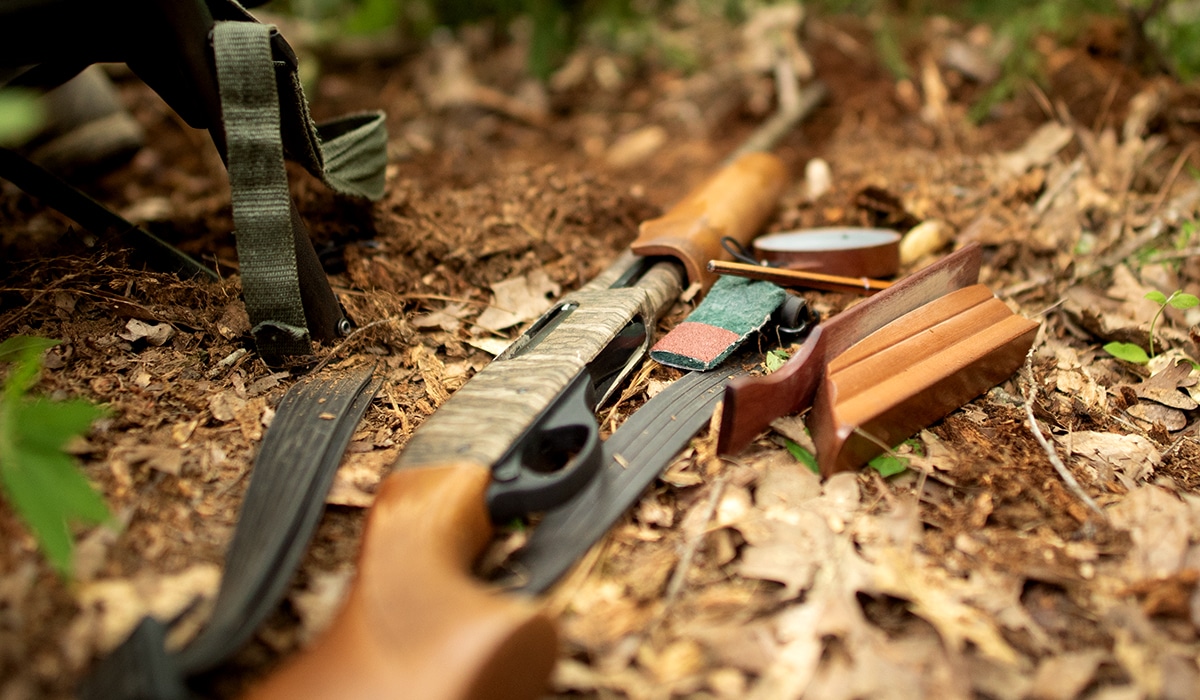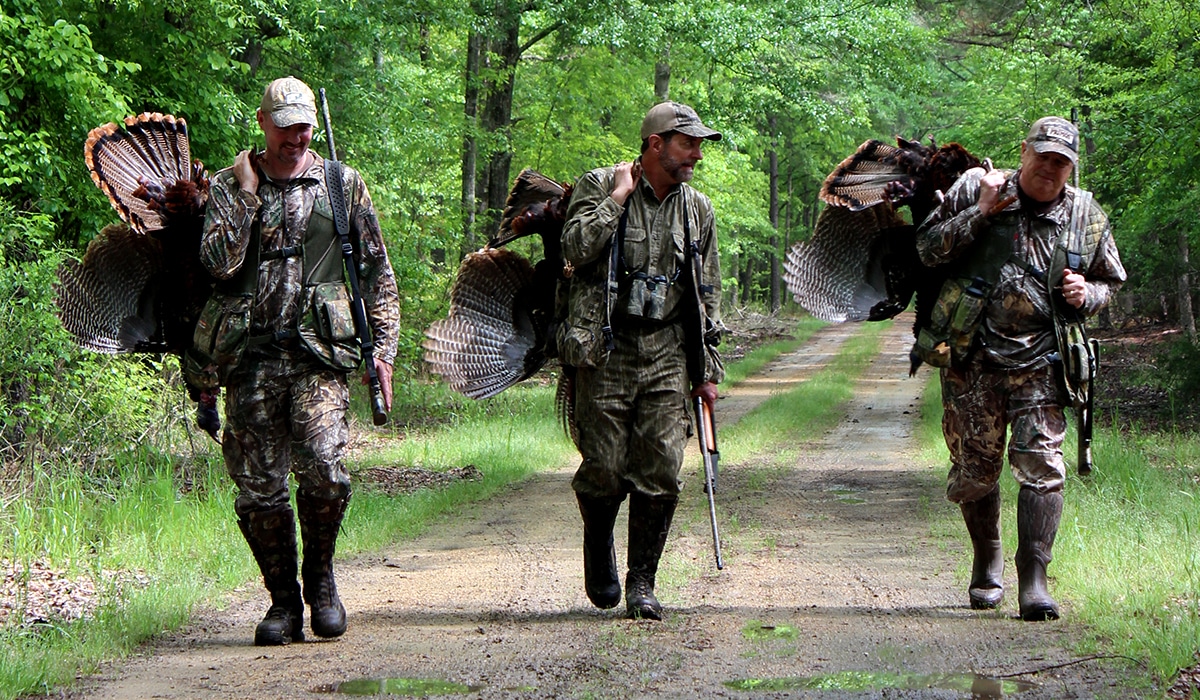A series of exclusive interviews with living legends in the hunting world. We define success differently than Boone and Crockett scores or getting the Big Five. Instead, we have candid conversations with hunters about how they got started, what it means to them today, and what issues are important to them for preserving the future of hunting for the next generation.
For many hunters, Will Primos is an instantly recognizable name. Likely, you can point to any number of game calls or hunting equipment you have marked with “Primos Hunting,” or you’ve heard the slogans, “Speak the Language” or “Truth About Hunting.” With spring turkey seasons beginning to bloom across the country, we immediately thought of this hunting legend, who was one of the first to have a successful hunting show and made the art of game calling accessible to everyone.

The Early Years
Tell us one of your first hunting stories.
Jimmy Primos is my cousin, and he’s five years older than me. I’m 68 now, and he’s 73. Growing up, when you’re five years old, a 10-year-old was like, “Oh, my gosh,” you know? Jimmy and I lived on the same small farm, a rural place of about 52 acres. He lived on one end, and I lived on another, so to speak. Jimmy was my hero because he hunted.
He was always shooting. He had pellet guns. He had a .280 and a .243, and I was just enamored by all of that, and he took me on my first hunt at five years old. He gave me one of his used pellet guns, which was a Crossman brand that you screwed a cylinder to the end of it right under where the bullet came out of the muzzle. I don’t remember how many shots it had, but I do wish I still had the danged thing.
He took me on my first hunt on our little farm, and our game that day was grackles—big blackbirds. And I shot one. I was fired up and excited, and he said, “Now we’re going to clean it and cook it.” He’s 10 years old and teaching me this. Well, he was trying to make fun of me so he could tell everybody he made a little Will eat a blackbird. But I plucked the dang thing and gutted it and put it on a stick and built a fire and roasted it. I ate it, and it was great. I remember it being great.
He was trying to make fun of me so he could tell everybody he made a little Will eat a blackbird. But I plucked the dang thing and gutted it and roasted it. I ate it, and it was great. I remember it being great.
What inspired you to start making game calls?
I remember when I was 11, my uncle Gus took me to a place called Fighting Bayou [Hunting Club], and that’s where I first really got to see ducks in green timber come to the call. Uncle Gus was blowing a call called a Jake Gartner. That call just inspired me, and I knew right then I was going to learn to do this. My daddy had a little woodworking shop. He liked to piddle with making stuff, and he had a lathe, so I came home with Gus’s call and took it apart. I drew it out and then turned on a lathe, trying to make that call. It didn’t work real good. I had no concept of how incredibly accurate and perfect it had to be for the sound it was trying to make. That was my first attempt at making a call.
Then I started turkey hunting. One of my uncle’s friends, Buck Dearman, encouraged me by giving me a mouth turkey call that kept falling apart. He said they last him about three days, so he asked me to make him one that would last longer. So I took the thing apart and made him a new one. He called it “The Rock of Gibraltar” because the dang thing was so solid. What I had used was tin beer cans to make three reeds stacked on top of each other.
Anyway, I started making those calls, and it took me days to make one call. Everybody was loving them. I made triples. I made doubles. I made singles. They were crude when you looked at them, but they performed quite well.
Then one thing led to another and I decided one day to go to one of those outdoor shows. I was probably in my early 20s by then. I went to one of these outdoor shows with my calls and I sold out. I remember I left there with about $1,800 in my pocket and I thought, “Holy crud, I might be able to make a living out of this.”
What I had used was tin beer cans to make three reeds stacked on top of each other.

Hunting on TV
You were one of the first hunters to have a TV show. How did that happen?
I started selling calls in 1976. After several years, I started looking for another way to market the company. At that time, in 1982, the audio cassette was how we listened to our music. So I thought, “You know what? What if I could actually record a turkey hunt and you could hear my footsteps; they could hear me call, hear the turkey gobble, hear the gunshot, hear me run to the turkey, and hear the turkey flop?”
So I did that. I hired a guy who had a video and audio production company, and he was excited about it. He wasn’t a hunter, but he followed me in the woods. He would sit out there on the forest floor and had a huge parabolic mic. He would point it where he wanted it to be, at me, or the turkey, the tree, or wherever. And so we recorded the hunt.
I gave lessons on how to make every sound that I knew the turkey made. Then I got a couple of other guys to help me, talking back and forth, so it wouldn’t be all about me. And I advertised that little audio cassette in 1983. I believe the name of it was “Wild Turkey Calling In and Hunting Instruction.” It was a stupid name, but the tape sold like crazy, and my sales went through the roof.
Shortly after that, around 1986, the video camera and VCR became available, so we started videotaping our hunts. There was one person who tried to do that before me, and they faked it. They used a turkey that had a string tied to his foot so he couldn’t run away, and they were acting like they were calling him up. It was absolutely horrible.
I hired a guy who was one of my customers. His name was Ronnie “Cuz” Strickland. He was my cameraman, and after the year was over, I think we had 12 hunts between me and him and everyone we could take hunting. I said, “What are we gonna call this thing?” And Cuz says, “I don’t know, but all I do know is that this is the truth.” I said, “That’s it. We’ll call it the Truth.” That started the “Primos Truth” turkey series, and then came deer and elk and all the other stuff.
Would you consider yourself a professional hunter?
I don’t consider myself a professional hunter…at all. There are so many people better than me. I just love to be there. I love to do it, and I find it a little bit hard labeling somebody a professional hunter. I guess you’re a professional if you make your living doing it, so part of my living was hunting. I guess that fits, but it’s not where my head goes. I just love doing it. I really enjoyed going hunting, but it was also about promotion, promoting and understanding the product. You know you’ve got to have something to promote. You’ve got to have something to build on. When you’re proving the product, it gives you a lot of strength to your customer. I’m real big about the customer. The customer is king.
If you wanted to get into this world and it’s about your ego and it’s about getting to hunt for a living, I’m not so sure you’re going to be a success because those two things will defeat you.

Do you use onX Hunt in the field?
Oh my gosh, if I had this tool long before I did, I would have been deadly. What a neat thing. With onX, I’m marking stuff all the time. I’ve found things on pieces of property I have access to that I’ve hunted for years that I didn’t even know was there. It’s just great.
I’m not real technologically savvy, but I’m learning. I have a friend who is savvy, and he’s a young kid in his late 20s. He called me one day and said, “Man, you know that national forest we hunt? Did you know there’s a finger of it that comes up north of us? I found it on onX. I went over there this afternoon and heard three turkeys gobbling.” He went back the next morning and killed one of them.
onX just makes it so much easier to plan your hunt and see places that are public that you didn’t know were public. I mean, how many people do you know that put “Posted” signs on public land? It happens.
The Next Generation of Hunters
What role do we have as hunters for the next generation?
I have a friend who helps me around the house, and he’s got a 12-year-old daughter who wanted to learn to bow hunt. She had been shooting a bow that had too long of a draw, but she figured out how to shoot it. I said he should bring her over. The first thing I did was check her eye dominance. She was shooting right-handed, but she’s extremely left-eye dominant.
Okay, first thing we need to do is switch her. She’s 12 years old. We need to do that now. You need to do that with a gun and a bow, or she’ll never be as good as she can be. And she’ll enjoy the sport more if she will learn to go left-handed.
We got her a left-handed bow, and he gave it to her for Christmas. By New Year’s Day, she was hitting bullseyes at 15 yards. Next, we set her up with a treestand on my place, and we’ll show her how to use a lifeline and get in and out of the stand safely.
That very afternoon, she drilled a doe at 15 yards. It ran 40 yards and dropped. So introducing young people like that is so important, but you’ve got to take the time to do it right. We’ve got that knowledge. We’ve got to pass it on so somebody can enjoy it.
Photos courtesy of Primos Hunting.